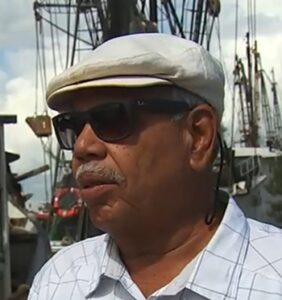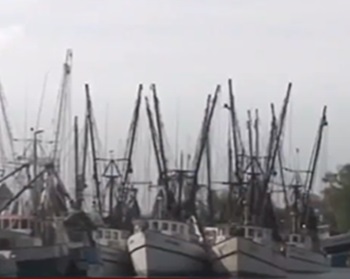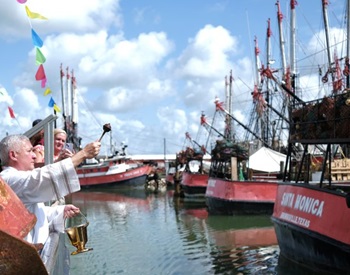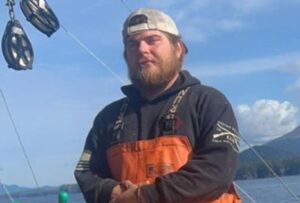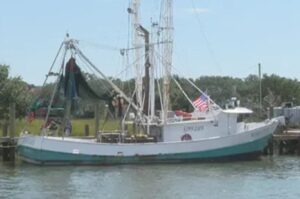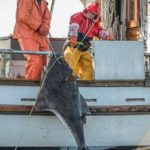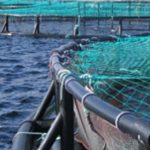Category Archives: Gulf of Mexico
Southern Shrimp Alliance Welcomes NOAA Fisheries’ Confirmation that U.S. Wild-Caught Shrimp Is the Sustainable Choice
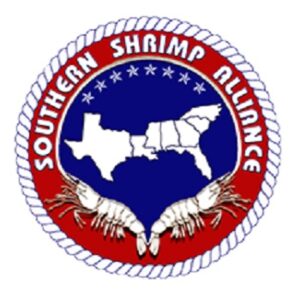 Last week, NOAA Fisheries published an on-line resource with facts regarding wild-caught American shrimp, explaining what makes it a sustainable seafood choice. Shrimp is, far and away, the most popular seafood in America. As NOAA Fisheries explains, “now about one-quarter of the seafood Americans eat is shrimp.” Yet, despite Americans’ love of shrimp, the U.S. shrimp industry is struggling. NOAA Fisheries notes that despite the fact that landings volumes were roughly the same in 2023 as they were in 2022, preliminary data from the Gulf of Mexico show that the industry sold $329 million of wild-caught shrimp in 2022 and that revenue dropped to $204 million in 2023 – a 38 percent drop.” more, >>CLICK TO READ<< 16:29
Last week, NOAA Fisheries published an on-line resource with facts regarding wild-caught American shrimp, explaining what makes it a sustainable seafood choice. Shrimp is, far and away, the most popular seafood in America. As NOAA Fisheries explains, “now about one-quarter of the seafood Americans eat is shrimp.” Yet, despite Americans’ love of shrimp, the U.S. shrimp industry is struggling. NOAA Fisheries notes that despite the fact that landings volumes were roughly the same in 2023 as they were in 2022, preliminary data from the Gulf of Mexico show that the industry sold $329 million of wild-caught shrimp in 2022 and that revenue dropped to $204 million in 2023 – a 38 percent drop.” more, >>CLICK TO READ<< 16:29

Trump Defeats Harris to Win a Second White House Term
Former President Donald Trump was elected the 47th president of the United States on Wednesday, mounting one of the greatest political comebacks of all time – a convicted felon who was twice impeached and left the presidency in disgrace just four years ago, only to win it back decisively in one of the most fraught elections in modern history. In defeating Vice President Kamala Harris, Trump stitched together an improbable coalition of supporters, including people of color and young voters, while promising to unfurl an America-first vision. With his victory all but assured early Wednesday morning, Trump told cheering supporters at a convention center in West Palm Beach, Florida, that “this was a movement like nobody’s ever seen before.” more, >>CLICK TO READ<< 07:41
Lifelong Commercial Fisherman Jonas R. Porter of Woodville, Florida, has passed away
 Jonas R. Porter, 86, of Woodville, passed away November 3, 2024. Jonas was born in Sopchoppy and remained a life-long resident of this area. He was a Commercial Fisherman all of his life and was a true fishing storyteller; you never knew if it was the truth or not and he always got a good laugh. Jonas has always been a voice for all fishermen; he stood for what he believed in. He also was a Handyman and enjoyed building things, also enjoyed music, singing and playing the guitar. Jonas loved his family and friends and spoiled his grandkids; he loved people. He would want you to know that he supported Trump. more, >>CCLICK TO READ<< 05:56
Jonas R. Porter, 86, of Woodville, passed away November 3, 2024. Jonas was born in Sopchoppy and remained a life-long resident of this area. He was a Commercial Fisherman all of his life and was a true fishing storyteller; you never knew if it was the truth or not and he always got a good laugh. Jonas has always been a voice for all fishermen; he stood for what he believed in. He also was a Handyman and enjoyed building things, also enjoyed music, singing and playing the guitar. Jonas loved his family and friends and spoiled his grandkids; he loved people. He would want you to know that he supported Trump. more, >>CCLICK TO READ<< 05:56
Historic Cortez Fishing Village continues work despite hurricane damage
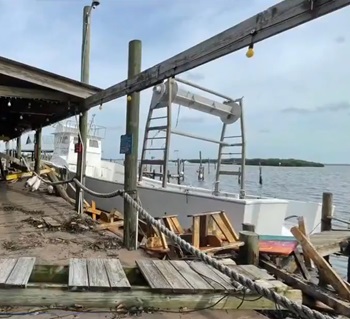 The Cortez Fishing Village has weathered a lot, but Hurricanes Helene and Milton put them to the test. “I’ve seen other storms that hurt us in different ways, but this one hurt literally thousands and thousands of people,” said Kent Nixon, a stone crab fisherman who has been part of the Cortez Fishing Village for decades. Docks were damaged during Hurricane Helene and are now being replaced. Milton also damaged the roof of the A.P. Bell Fish Company’s fish house. Clean-up continues all around the fishing village as crews and boats work on the water. Video, more, >>CLICK TO READ<< 09:05
The Cortez Fishing Village has weathered a lot, but Hurricanes Helene and Milton put them to the test. “I’ve seen other storms that hurt us in different ways, but this one hurt literally thousands and thousands of people,” said Kent Nixon, a stone crab fisherman who has been part of the Cortez Fishing Village for decades. Docks were damaged during Hurricane Helene and are now being replaced. Milton also damaged the roof of the A.P. Bell Fish Company’s fish house. Clean-up continues all around the fishing village as crews and boats work on the water. Video, more, >>CLICK TO READ<< 09:05
Is U.S. Wild-Caught Shrimp Sustainable? The Short Answer Is Yes
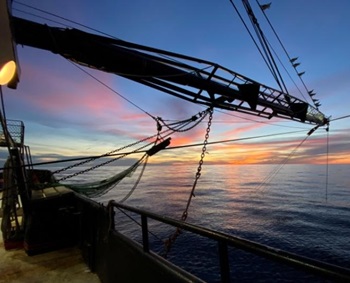 U.S.-harvested shrimp is nutritious, delicious… and sustainable! The shrimp fishery has also historically been a culturally important economic engine. It provides a livelihood for thousands of U.S. commercial fishermen. U.S. shrimp are a sustainable seafood option, and the United States sets a global precedent for shrimp trawl bycatch reduction. But our nation’s shrimp industry is struggling to stay afloat and there’s confusion about its sustainability. Here are the facts about U.S. wild-caught shrimp. Most U.S. shrimp are caught in the Southeast from Texas to North Carolina. Three species—white shrimp, pink shrimp, and brown shrimp—make up the vast majority of the shrimp caught. more, >>CLICK TO READ<< 10:22
U.S.-harvested shrimp is nutritious, delicious… and sustainable! The shrimp fishery has also historically been a culturally important economic engine. It provides a livelihood for thousands of U.S. commercial fishermen. U.S. shrimp are a sustainable seafood option, and the United States sets a global precedent for shrimp trawl bycatch reduction. But our nation’s shrimp industry is struggling to stay afloat and there’s confusion about its sustainability. Here are the facts about U.S. wild-caught shrimp. Most U.S. shrimp are caught in the Southeast from Texas to North Carolina. Three species—white shrimp, pink shrimp, and brown shrimp—make up the vast majority of the shrimp caught. more, >>CLICK TO READ<< 10:22
Fewer fish spills reported after Louisiana pushes pogy boats from coast
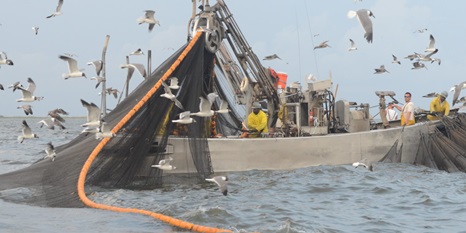 In 2022, a menhaden fishing ship and its net boats spilled about a million fish off the Louisiana coast, leaving the floating mass to rot in the summer sun. A few months later, another spill blanketed Louisiana beaches with an estimated 850,000 dead fish. The two incidents pushed the state’s leaders to enact the first significant restrictions on the Gulf of Mexico’s largest but least-regulated fishery. Starting this year, catchers of menhaden, a foot-long fish with a host of industrial uses, must stay a half mile from much of the Louisiana coast and a mile from three ecologically sensitive areas. But the menhaden industry says better nets rather than bigger buffers have played a far bigger role in reducing spills. Photos, more, >>CLICK TO READ<< 09:44
In 2022, a menhaden fishing ship and its net boats spilled about a million fish off the Louisiana coast, leaving the floating mass to rot in the summer sun. A few months later, another spill blanketed Louisiana beaches with an estimated 850,000 dead fish. The two incidents pushed the state’s leaders to enact the first significant restrictions on the Gulf of Mexico’s largest but least-regulated fishery. Starting this year, catchers of menhaden, a foot-long fish with a host of industrial uses, must stay a half mile from much of the Louisiana coast and a mile from three ecologically sensitive areas. But the menhaden industry says better nets rather than bigger buffers have played a far bigger role in reducing spills. Photos, more, >>CLICK TO READ<< 09:44
New Orleans shrimp festival passes genetic test confirming Gulf Coast origin
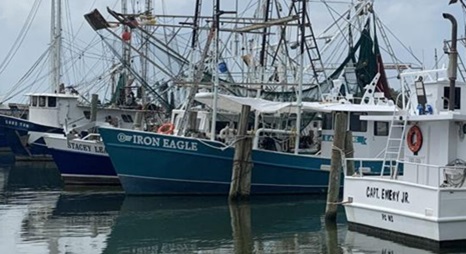 Recent genetic tests have revealed that two major Southern seafood festivals served imported, farm-raised shrimp instead of the Gulf-caught varieties they advertised, sparking concerns among local commercial fishermen and seafood advocates. SEAD Consulting, at the request of regional shrimpers, used its RIGHTTest genetic testing technology to identify the origins of shrimp labeled as Gulf-caught at these events. Results showed widespread mislabeling at both the Louisiana Shrimp & Petroleum Festival in Morgan City and the National Shrimp Festival in Gulf Shores, Ala. Not all festivals failed the test, however. At the Louisiana Shrimp Festival & Shrimp Aid in New Orleans, which was also tested, every vendor passed the RIGHTTest, proving that all shrimp served at this event was authentic, wild-caught Gulf shrimp. more, >>CLICK TO READ<< 09:48
Recent genetic tests have revealed that two major Southern seafood festivals served imported, farm-raised shrimp instead of the Gulf-caught varieties they advertised, sparking concerns among local commercial fishermen and seafood advocates. SEAD Consulting, at the request of regional shrimpers, used its RIGHTTest genetic testing technology to identify the origins of shrimp labeled as Gulf-caught at these events. Results showed widespread mislabeling at both the Louisiana Shrimp & Petroleum Festival in Morgan City and the National Shrimp Festival in Gulf Shores, Ala. Not all festivals failed the test, however. At the Louisiana Shrimp Festival & Shrimp Aid in New Orleans, which was also tested, every vendor passed the RIGHTTest, proving that all shrimp served at this event was authentic, wild-caught Gulf shrimp. more, >>CLICK TO READ<< 09:48
Election Jitters, Industry Headwinds Undermine Biden’s Final Offshore Wind Auction
 A U.S. auction of offshore wind development rights in the Gulf of Maine on Tuesday drew bids for only half of the eight offered leases, for a total of just $21.9 million in high bids, in the latest sign of deep industry malaise. The sale was a stark display of the lack of industry appetite for new investment after a year of high-profile setbacks that include canceled projects, two shelved lease sales in Oregon and the Gulf of Mexico and a construction accident at the nation’s first major offshore wind project. The auction was the last before President Joe Biden, a Democrat, leaves office in January. more, >>CLICK TO READ<< 07:25
A U.S. auction of offshore wind development rights in the Gulf of Maine on Tuesday drew bids for only half of the eight offered leases, for a total of just $21.9 million in high bids, in the latest sign of deep industry malaise. The sale was a stark display of the lack of industry appetite for new investment after a year of high-profile setbacks that include canceled projects, two shelved lease sales in Oregon and the Gulf of Mexico and a construction accident at the nation’s first major offshore wind project. The auction was the last before President Joe Biden, a Democrat, leaves office in January. more, >>CLICK TO READ<< 07:25
Gov. DeSantis Announces $1 Million To Rebuild Fishing, Aquaculture Infrastructure Damaged By Hurricanes
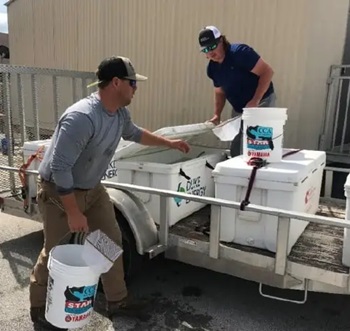 Governor Ron DeSantis announced today the allocation of $1,000,000 from the Florida Disaster Fund to the Fish and Wildlife Foundation of Florida. The funding will be used to repair fishing and aquaculture infrastructure in the Big Bend region that was severely damaged by Hurricanes Helene and Milton. “The Big Bend’s fishing industry took a direct hit from hurricanes Debby and Helene, and so did the hardworking Floridians who make their living on the water,” said Governor Ron DeSantis. “Today’s investments will help to rebuild critical waterside infrastructure and help get Floridians in the fishing and aquaculture industries back to full operations.” more, >>CLICK TO READ<< 08:09
Governor Ron DeSantis announced today the allocation of $1,000,000 from the Florida Disaster Fund to the Fish and Wildlife Foundation of Florida. The funding will be used to repair fishing and aquaculture infrastructure in the Big Bend region that was severely damaged by Hurricanes Helene and Milton. “The Big Bend’s fishing industry took a direct hit from hurricanes Debby and Helene, and so did the hardworking Floridians who make their living on the water,” said Governor Ron DeSantis. “Today’s investments will help to rebuild critical waterside infrastructure and help get Floridians in the fishing and aquaculture industries back to full operations.” more, >>CLICK TO READ<< 08:09
Athearn Marine Agency Boat of the Week: 70′ Williams Shrimp Trawler
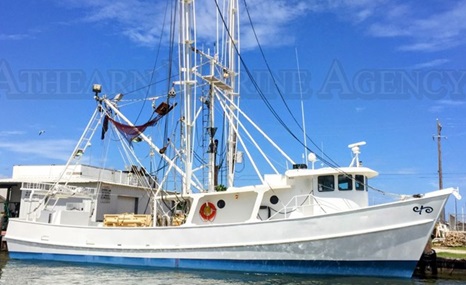 To review specifications, information, and 46 photos’,>click here< To see all the boats in this series, >click here< 06:24
To review specifications, information, and 46 photos’,>click here< To see all the boats in this series, >click here< 06:24
Another festival caught selling imported shrimp as ‘Gulf’ shrimp
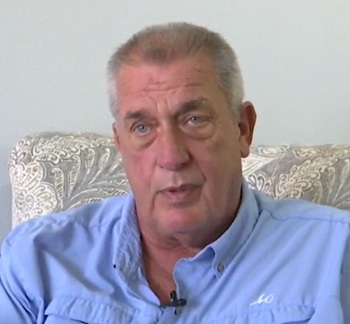 The Morgan City Shrimp and Petroleum Festival was recently in the spotlight for selling imported shrimp. The same consultant group who genetically tested the shrimp continued their investigation at the National Shrimp Festival in Gulf Shores and found the same situation. SeaD Consulting tested five vendors at the National Shrimp Festival that advertised to have Gulf shrimp. Of the five, only one had authentic Gulf shrimp: Rouse’s Supermarket. SeaD Consulting recently found similar results for the Shrimp and Petroleum Festival in Morgan City, with only one of the five vendors sampled actually serving shrimp from the Gulf of Mexico. Video, links, more, >>CLICK TO READ<< 07:39
The Morgan City Shrimp and Petroleum Festival was recently in the spotlight for selling imported shrimp. The same consultant group who genetically tested the shrimp continued their investigation at the National Shrimp Festival in Gulf Shores and found the same situation. SeaD Consulting tested five vendors at the National Shrimp Festival that advertised to have Gulf shrimp. Of the five, only one had authentic Gulf shrimp: Rouse’s Supermarket. SeaD Consulting recently found similar results for the Shrimp and Petroleum Festival in Morgan City, with only one of the five vendors sampled actually serving shrimp from the Gulf of Mexico. Video, links, more, >>CLICK TO READ<< 07:39
Photos: Louisiana Shrimp Fest/ Shrimp Aid brings attention to the struggling local shrimp industry
 The Louisiana Shrimp Fest/ Shrimp Aid was held at the Broadside in New Orleans on Sunday. Local chefs and coastal organizations put on the new festival to bring attention to the struggling local shrimp industry and the people effected. Dishes with local caught shrimp were served by a variety vendors as musician performed on the stage. Panel discussions with shrimpers and people involved in the industry stressed the need for consumers to ask where their shrimp comes from and to demand locally caught shrimp. Photos, more, >>CLICK TO READ<<08:39
The Louisiana Shrimp Fest/ Shrimp Aid was held at the Broadside in New Orleans on Sunday. Local chefs and coastal organizations put on the new festival to bring attention to the struggling local shrimp industry and the people effected. Dishes with local caught shrimp were served by a variety vendors as musician performed on the stage. Panel discussions with shrimpers and people involved in the industry stressed the need for consumers to ask where their shrimp comes from and to demand locally caught shrimp. Photos, more, >>CLICK TO READ<<08:39
Biden administration races to shell out billions for clean energy as election nears
 The Biden administration is shelling out billions of dollars for clean energy and approving major offshore wind projects as officials race to secure major climate initiatives before President Joe Biden’s term comes to an end. Biden wants to establish a legacy for climate action that includes locking in a trajectory for reducing the nation’s planet-warming greenhouse gas emissions. Former President Donald Trump has pledged to rescind unspent funds in Biden’s landmark climate and health care bill and stop offshore wind development if he returns to the White House in January. Vice President Kamala Harris, who became the Democratic nominee after Biden dropped from the race this summer, has said she will pursue a climate agenda similar to Biden’s, focused on reducing emissions, deploying renewables and creating clean energy jobs. more, >>CLICK TO READ<< 09:46
The Biden administration is shelling out billions of dollars for clean energy and approving major offshore wind projects as officials race to secure major climate initiatives before President Joe Biden’s term comes to an end. Biden wants to establish a legacy for climate action that includes locking in a trajectory for reducing the nation’s planet-warming greenhouse gas emissions. Former President Donald Trump has pledged to rescind unspent funds in Biden’s landmark climate and health care bill and stop offshore wind development if he returns to the White House in January. Vice President Kamala Harris, who became the Democratic nominee after Biden dropped from the race this summer, has said she will pursue a climate agenda similar to Biden’s, focused on reducing emissions, deploying renewables and creating clean energy jobs. more, >>CLICK TO READ<< 09:46
Cortez fishing village works to recover after hurricanes Helene and Milton
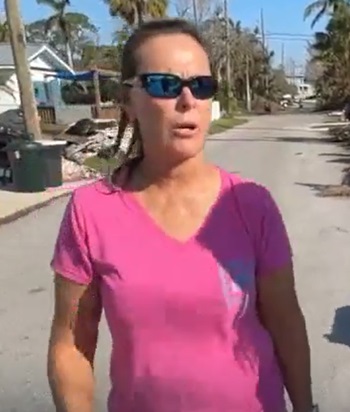 There is devastation on every corner in Cortez Village, a quaint fishing village off the coast of Manatee County. Hurricanes Helene and Milton hit this community hard, and now they are working to pick up the pieces and preserve their historic village. Captain Kathy Fannon showed us the damage to her home. She said it is hard to see the reality that lies ahead. “We lost everything. Everyone on this block had four feet of water through their house, so we lost all the contents. We have absolutely nothing left inside,” Captain Kathy said. Captain Kathy’s family works in the fishing industry, and her daughter, Katie Tupin, lives across the street. Tupin said, “My dad runs a shrimping boat. He’s a commercial fisherman. I’ve been doing charters for 14 years and my mom for 25. Both lost everything during the storm. Video, more, >> CLICK TO READ<< 14:09
There is devastation on every corner in Cortez Village, a quaint fishing village off the coast of Manatee County. Hurricanes Helene and Milton hit this community hard, and now they are working to pick up the pieces and preserve their historic village. Captain Kathy Fannon showed us the damage to her home. She said it is hard to see the reality that lies ahead. “We lost everything. Everyone on this block had four feet of water through their house, so we lost all the contents. We have absolutely nothing left inside,” Captain Kathy said. Captain Kathy’s family works in the fishing industry, and her daughter, Katie Tupin, lives across the street. Tupin said, “My dad runs a shrimping boat. He’s a commercial fisherman. I’ve been doing charters for 14 years and my mom for 25. Both lost everything during the storm. Video, more, >> CLICK TO READ<< 14:09
Galveston business entangled in net of fraud allegations and whistleblowers
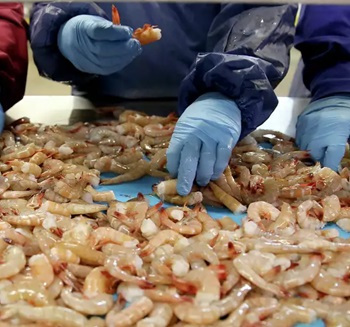 A shrimp business and former market that has been a cornerstone of Galveston for more than 45 years is in the muck, as it and its parent company are mired in a number of lawsuits alleging everything from fraud to shorting an employee. Galveston Shrimp Company was founded in 1978 by Sicilian immigrant Rosario Cassarino. For nearly 20 years, Rosario and wife Giovanna sold fish and shrimp that was brought onto the island. Their son Nello Cassarino assumed a leadership role in Galveston Shrimp Co. in 1994, and in 2011 he re-formed the company under the umbrella of Pacific Seafood, a family-owned market and business out of Portland, Ore. But now there’s a rift between Cassarino and Pacific Seafood, which owns 80 percent of Galveston Shrimp Co. According to ongoing litigation as reported by the Galveston Daily News, Cassarino is suing Pacific Seafood for $1 million, accusing the company of shorting him on revenue and self-dealing. Cassarino originally filed the lawsuit in Texas in 2023, but a judge moved the suit to Oregon. More, >>CLICK TO READ<< 10:04
A shrimp business and former market that has been a cornerstone of Galveston for more than 45 years is in the muck, as it and its parent company are mired in a number of lawsuits alleging everything from fraud to shorting an employee. Galveston Shrimp Company was founded in 1978 by Sicilian immigrant Rosario Cassarino. For nearly 20 years, Rosario and wife Giovanna sold fish and shrimp that was brought onto the island. Their son Nello Cassarino assumed a leadership role in Galveston Shrimp Co. in 1994, and in 2011 he re-formed the company under the umbrella of Pacific Seafood, a family-owned market and business out of Portland, Ore. But now there’s a rift between Cassarino and Pacific Seafood, which owns 80 percent of Galveston Shrimp Co. According to ongoing litigation as reported by the Galveston Daily News, Cassarino is suing Pacific Seafood for $1 million, accusing the company of shorting him on revenue and self-dealing. Cassarino originally filed the lawsuit in Texas in 2023, but a judge moved the suit to Oregon. More, >>CLICK TO READ<< 10:04
‘Boats can be replaced, but not a human’: Peoria fisherman shares crewmate’s memorable Hurricane Milton rescue from sea
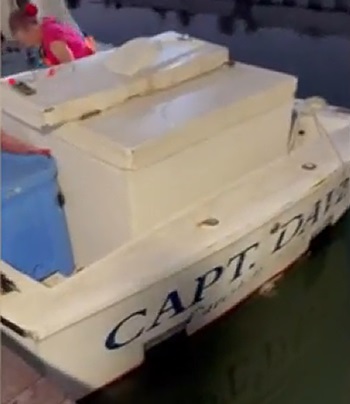 A Coast Guard crew from a Miami base rescued a commercial fisherman who rode Hurricane Milton out inside a fishing cooler. Steven Hawley of Peoria owned a boat called “Capt. Dave” that now lies at the bottom of the sea. The vessel is part of his commercial fishing company off Florida’s Gulf Coast. Hawley wasn’t in Florida when Hurricane Milton hit, but his fishing crew was. On Monday, Hawley’s employee was riding into shore when the alternator and battery on Capt. Dave died about 20 miles from St. Petersburg. According to Coast Guard District 7, a rescue boat and helicopter crew lifted two people from Capt. Dave but left the watercraft in the ocean. On Wednesday, Hawley’s crew made an effort to bring Capt. Dave in before Hurricane Milton made landfall. Hawley said his crew dropped the captain off and rode into shore. Video, more, >>CLICK TO READ<< 06:38
A Coast Guard crew from a Miami base rescued a commercial fisherman who rode Hurricane Milton out inside a fishing cooler. Steven Hawley of Peoria owned a boat called “Capt. Dave” that now lies at the bottom of the sea. The vessel is part of his commercial fishing company off Florida’s Gulf Coast. Hawley wasn’t in Florida when Hurricane Milton hit, but his fishing crew was. On Monday, Hawley’s employee was riding into shore when the alternator and battery on Capt. Dave died about 20 miles from St. Petersburg. According to Coast Guard District 7, a rescue boat and helicopter crew lifted two people from Capt. Dave but left the watercraft in the ocean. On Wednesday, Hawley’s crew made an effort to bring Capt. Dave in before Hurricane Milton made landfall. Hawley said his crew dropped the captain off and rode into shore. Video, more, >>CLICK TO READ<< 06:38
Coast Guard rescues man off Longboat Key following Hurricane Milton
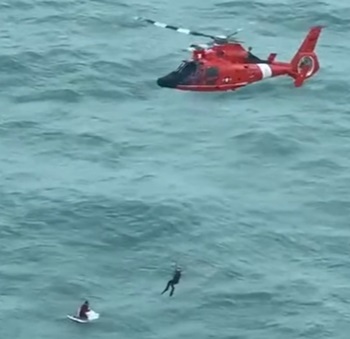 A Coast Guard Air Station Miami helicopter crew rescued a man, Thursday, approximately 30 miles off Longboat Key following Hurricane Milton. The aircrew brought the man to Tampa General Hospital for further care, after he was found clinging to a cooler wearing a life jacket at approximately 1:30 p.m. Airplane and helicopter crews from Air Station Clearwater currently deployed to Aviation Training Center Mobile for storm avoidance, and Air Station Miami launched at approximately 5:30 a.m. to search for the missing captain. Monday, the captain of the fishing vessel Capt. Dave reported to Coast Guard Sector St. Petersburg watchstanders, at approximately 12:40 p.m., he and a crew member were disabled approximately 20 miles off John’s Pass. Video, more, >>CLICK TO READ<< 21:27
A Coast Guard Air Station Miami helicopter crew rescued a man, Thursday, approximately 30 miles off Longboat Key following Hurricane Milton. The aircrew brought the man to Tampa General Hospital for further care, after he was found clinging to a cooler wearing a life jacket at approximately 1:30 p.m. Airplane and helicopter crews from Air Station Clearwater currently deployed to Aviation Training Center Mobile for storm avoidance, and Air Station Miami launched at approximately 5:30 a.m. to search for the missing captain. Monday, the captain of the fishing vessel Capt. Dave reported to Coast Guard Sector St. Petersburg watchstanders, at approximately 12:40 p.m., he and a crew member were disabled approximately 20 miles off John’s Pass. Video, more, >>CLICK TO READ<< 21:27
Catching a glimpse of the Mississippi seafood industry
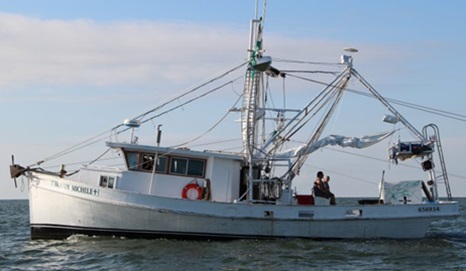 If you were asked to list the seafood available from the nutrient-rich waterways along the Mississippi Gulf Coast, how many could you name? What comprises the shellfish? The finfish? Go! Sadly, I could only name a few. That is why there is a website provided by Mississippi Seafood that gives us the information we need. The seafood identification, scientific name, common name, season, peak season, and similar species are included. There are suggested cooking methods and a description regarding the flavor of each seafood mentioned. There are brown, pink, and white shrimp, oysters, and blue crabs under the shellfish category. Then, for the finfish, there are Mississippi Gulf Black Drum, Flounder, Mullett, and Red Drum. Red, Mangrove, Lane, and Yellowtail are part of the snapper family. Another one is the Mississippi Spotted Sea Trout. more, >>CLICK TO READ<< 09:34
If you were asked to list the seafood available from the nutrient-rich waterways along the Mississippi Gulf Coast, how many could you name? What comprises the shellfish? The finfish? Go! Sadly, I could only name a few. That is why there is a website provided by Mississippi Seafood that gives us the information we need. The seafood identification, scientific name, common name, season, peak season, and similar species are included. There are suggested cooking methods and a description regarding the flavor of each seafood mentioned. There are brown, pink, and white shrimp, oysters, and blue crabs under the shellfish category. Then, for the finfish, there are Mississippi Gulf Black Drum, Flounder, Mullett, and Red Drum. Red, Mangrove, Lane, and Yellowtail are part of the snapper family. Another one is the Mississippi Spotted Sea Trout. more, >>CLICK TO READ<< 09:34
Hurricane Milton carves a path of destruction across Florida; millions without power or water
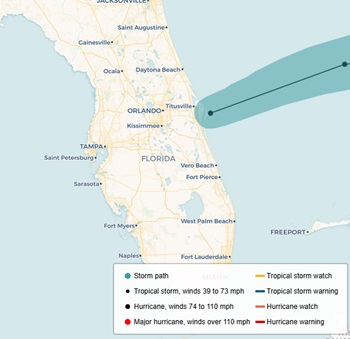 Millions of Floridians from coast to coast are assessing the overnight destruction left by Hurricane Milton, which made landfall at Siesta Key off Sarasota as a Category 3 storm at around 8:30 p.m. Wednesday, punched across the state and exited the east coast near Cape Canaveral before dawn Thursday. At least 2.6 million homes and businesses were without power, St. Petersburg residents without water, and major damage was done in the Tampa area, where flash flood warnings were still in effect Thursday. St. Petersburg residents also could no longer get water from their household taps because a water main break led the city to shut down service. St. Petersburg recorded over 16 inches of rain. Video, more, >>CLICK TO READ<< 06:50
Millions of Floridians from coast to coast are assessing the overnight destruction left by Hurricane Milton, which made landfall at Siesta Key off Sarasota as a Category 3 storm at around 8:30 p.m. Wednesday, punched across the state and exited the east coast near Cape Canaveral before dawn Thursday. At least 2.6 million homes and businesses were without power, St. Petersburg residents without water, and major damage was done in the Tampa area, where flash flood warnings were still in effect Thursday. St. Petersburg residents also could no longer get water from their household taps because a water main break led the city to shut down service. St. Petersburg recorded over 16 inches of rain. Video, more, >>CLICK TO READ<< 06:50
Darien shrimpers brace for Hurricane Milton
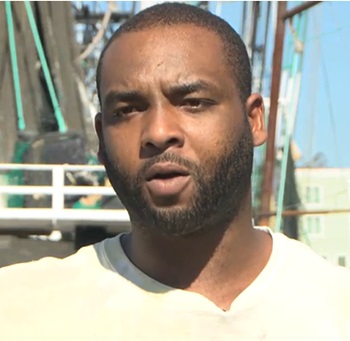 Communities across the southeast are closely watching Hurricane Milton as it crosses the gulf, especially local counties close to the Florida border. While shrimpers in Darien brace for Hurricane Milton, they’re still recovering from the effects of Helene. Shrimping is a major industry for the area, shrimpers say any storm causes concerns for them. “It has all the shrimp boat owners and captains pretty nervous about everything,” said local shrimper Jamey Bennett. While recovering, these shrimpers say they’re preparing for what’s next. “Believe it or not, most of the boats at this dock didn’t even take the lines off from the other hurricane because we seen the other one was brewing,” said shrimper Dwight “Wynn” Darwin Gale. Video, more, >>CLICK TO READ<< 13:35
Communities across the southeast are closely watching Hurricane Milton as it crosses the gulf, especially local counties close to the Florida border. While shrimpers in Darien brace for Hurricane Milton, they’re still recovering from the effects of Helene. Shrimping is a major industry for the area, shrimpers say any storm causes concerns for them. “It has all the shrimp boat owners and captains pretty nervous about everything,” said local shrimper Jamey Bennett. While recovering, these shrimpers say they’re preparing for what’s next. “Believe it or not, most of the boats at this dock didn’t even take the lines off from the other hurricane because we seen the other one was brewing,” said shrimper Dwight “Wynn” Darwin Gale. Video, more, >>CLICK TO READ<< 13:35
Offshore wind’s bogus benefits bragged on
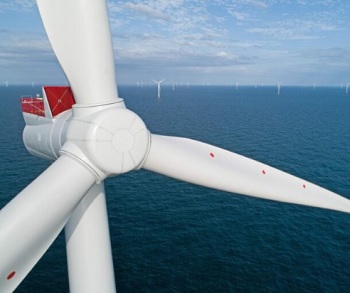 Resources for the Future (RFF) has produced a combined cost benefit analysis for 32 U.S. offshore wind projects now in development. They proudly point to the benefits outweighing the costs by a whopping 14 times. But these supposed benefits are not just exaggerated; they are fabricated. They simply do not exist. Their lengthy title is “Offshore Wind Power Examined: Effects, Benefits, and Costs of Offshore Wind Farms along the US Atlantic and Gulf Coasts”. The analysis is fairly simple which makes it easy to see the fallacies. There are just four basic benefit claims. And of course it is all based on highly questionable modeling. Before looking at each of these benefit claims it is worth noting a pervasive misconception. more, >>CLICK TO READ<< 09:18
Resources for the Future (RFF) has produced a combined cost benefit analysis for 32 U.S. offshore wind projects now in development. They proudly point to the benefits outweighing the costs by a whopping 14 times. But these supposed benefits are not just exaggerated; they are fabricated. They simply do not exist. Their lengthy title is “Offshore Wind Power Examined: Effects, Benefits, and Costs of Offshore Wind Farms along the US Atlantic and Gulf Coasts”. The analysis is fairly simple which makes it easy to see the fallacies. There are just four basic benefit claims. And of course it is all based on highly questionable modeling. Before looking at each of these benefit claims it is worth noting a pervasive misconception. more, >>CLICK TO READ<< 09:18
‘Life-threatening’ storm to remain major hurricane before Florida landfall, NHC says
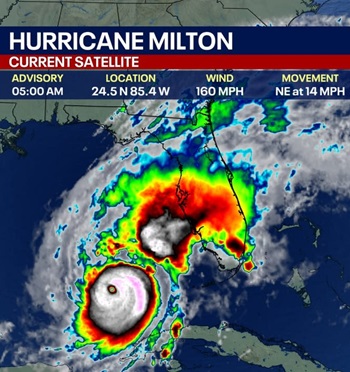 Hurricane Milton remained a Category 5 storm in the Gulf of Mexico through Tuesday night and into Wednesday morning. As of 5 a.m., Hurricane Milton was 300 miles from Tampa, Florida, with sustained winds of 160 mph. It is moving east-northeast at 14 mph. The minimum central pressure is 907 mb. “Milton is expected to remain an extremely dangerous major hurricane when it reaches the west-central coast of Florida”, the National Hurricane Center (NHC) said. In the 5 a.m. update, the National Hurricane Center said Hurricane Milton had sustained winds of 160 mph, making it a strong Category 5 storm on the Saffir-Simpson Hurricane Wind Scale. more, >>CLICK TO READ<< 08:12
Hurricane Milton remained a Category 5 storm in the Gulf of Mexico through Tuesday night and into Wednesday morning. As of 5 a.m., Hurricane Milton was 300 miles from Tampa, Florida, with sustained winds of 160 mph. It is moving east-northeast at 14 mph. The minimum central pressure is 907 mb. “Milton is expected to remain an extremely dangerous major hurricane when it reaches the west-central coast of Florida”, the National Hurricane Center (NHC) said. In the 5 a.m. update, the National Hurricane Center said Hurricane Milton had sustained winds of 160 mph, making it a strong Category 5 storm on the Saffir-Simpson Hurricane Wind Scale. more, >>CLICK TO READ<< 08:12
Milton remains an ‘extremely dangerous’ hurricane after weakening to Cat 4, forecasters warn
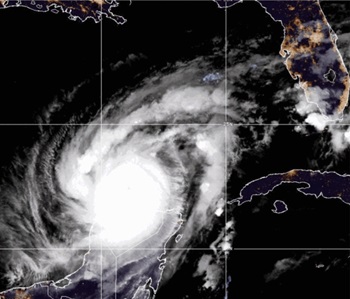 Hurricane Milton weakened slightly to a powerful Category 4 storm Tuesday morning while spiraling through the southern Gulf of Mexico and closer to Florida, according to the National Hurricane Center in Miami. Milton rapidly intensified from a tropical storm to a Category 5 hurricane on Monday, peaking with rare, sustained winds of 180 mph and becoming the strongest storm to ever form this late in the Atlantic season. Now, the hurricane is moving east-northeast at 12 mph with maximum sustained winds of 145 mph, NHC said in its latest update. However, forecasters warned that Milton’s change in strength doesn’t make it any less dangerous, adding that the storm will likely grow in size as it approaches Florida’s west coast and makes landfall Wednesday. more, >>CLICK TO READ<< 09:46
Hurricane Milton weakened slightly to a powerful Category 4 storm Tuesday morning while spiraling through the southern Gulf of Mexico and closer to Florida, according to the National Hurricane Center in Miami. Milton rapidly intensified from a tropical storm to a Category 5 hurricane on Monday, peaking with rare, sustained winds of 180 mph and becoming the strongest storm to ever form this late in the Atlantic season. Now, the hurricane is moving east-northeast at 12 mph with maximum sustained winds of 145 mph, NHC said in its latest update. However, forecasters warned that Milton’s change in strength doesn’t make it any less dangerous, adding that the storm will likely grow in size as it approaches Florida’s west coast and makes landfall Wednesday. more, >>CLICK TO READ<< 09:46
Louisiana lawmaker grills Shrimp & Petroleum Festival for selling imported shrimp
 A state lawmaker has issued a scathing rebuke of what she characterized as an embarrassing and “misleading” response from the Louisiana Shrimp & Petroleum Festival after the Illuminator reported that multiple vendors sold imported shrimp at this year’s event. State Rep. Jessica Domangue, R-Houma, wrote an open letter to festival organizers that she posted Thursday on Facebook. “Growing up in St. Mary Parish in a family of generations of commercial shrimpers, I was appalled to learn of the widespread selling of imported shrimp at the Louisiana Shrimp & Petroleum Festival,” Domangue wrote. “I found the festival’s official response in an October 1 press release to be an embarrassment.” The testing was performed at the five-day festival over the Labor Day weekend by Sea D Consulting, a food safety technology company that recently developed a rapid seafood species identification test in collaboration with Florida State University microbiologist Prashant Singh. more, >>CLICK TO READ<< 12:32
A state lawmaker has issued a scathing rebuke of what she characterized as an embarrassing and “misleading” response from the Louisiana Shrimp & Petroleum Festival after the Illuminator reported that multiple vendors sold imported shrimp at this year’s event. State Rep. Jessica Domangue, R-Houma, wrote an open letter to festival organizers that she posted Thursday on Facebook. “Growing up in St. Mary Parish in a family of generations of commercial shrimpers, I was appalled to learn of the widespread selling of imported shrimp at the Louisiana Shrimp & Petroleum Festival,” Domangue wrote. “I found the festival’s official response in an October 1 press release to be an embarrassment.” The testing was performed at the five-day festival over the Labor Day weekend by Sea D Consulting, a food safety technology company that recently developed a rapid seafood species identification test in collaboration with Florida State University microbiologist Prashant Singh. more, >>CLICK TO READ<< 12:32
Hurricane Milton strengthens into Category 4 as Florida prepares for evacuations, storm surge
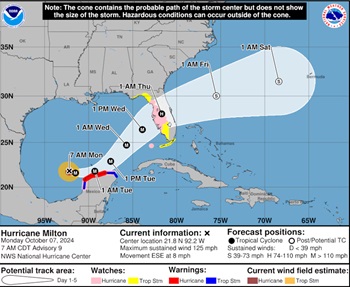 Milton rapidly strengthened into a Category 4 hurricane Monday on a path toward Florida population centers including Tampa and Orlando, threatening a dangerous storm surge in Tampa Bay and setting the stage for potential mass evacuations less than two weeks after a catastrophic Hurricane Helene swamped the coastline. The storm is expected to stay at about its current strength for the next couple of days, the National Hurricane Center in Miami said. Helene was also a Category 4 at landfall in northern Florida. Milton had maximum sustained winds of 150 mph (240 kph) over the southern Gulf of Mexico, the hurricane center said. Its center could make landfall Wednesday in the Tampa Bay area, and it could remain a hurricane as it moves across central Florida toward the Atlantic Ocean. more, >>CLICK TO READ<< 10:27
Milton rapidly strengthened into a Category 4 hurricane Monday on a path toward Florida population centers including Tampa and Orlando, threatening a dangerous storm surge in Tampa Bay and setting the stage for potential mass evacuations less than two weeks after a catastrophic Hurricane Helene swamped the coastline. The storm is expected to stay at about its current strength for the next couple of days, the National Hurricane Center in Miami said. Helene was also a Category 4 at landfall in northern Florida. Milton had maximum sustained winds of 150 mph (240 kph) over the southern Gulf of Mexico, the hurricane center said. Its center could make landfall Wednesday in the Tampa Bay area, and it could remain a hurricane as it moves across central Florida toward the Atlantic Ocean. more, >>CLICK TO READ<< 10:27
Where is the Federal Government? Couple reunited after volunteer rescue pilot threatened with arrest in North Carolina
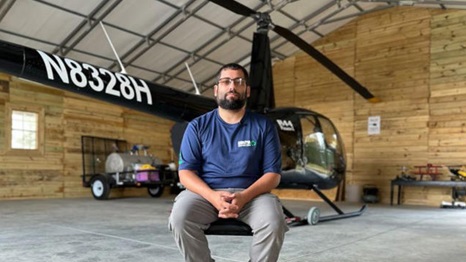 “I don’t think we ever ran out of hope. We had each other, and that was the main thing,” Mike Coffey said when asked if they started to believe help wouldn’t come by the third day after multiple helicopters had flown over without stopping. Not long after the sun rose Sunday morning, they heard the sweet sound of chopper blades ripping through the air. But it wasn’t a government worker coming to their aid, it was Jordan Seidhom, the owner of a scrap steel recycling business in Pageland, South Carolina. He’s also a pilot, former head of the Chesterfield County drug unit, reserve law enforcement officer, and volunteer firefighter — among other jobs. He decided the day after the storm to use his own helicopter on his own dime to answer the cries for help he read on social media within hours of the storm passing. Then on Sunday, the Seidhoms spotted Susan Coffey frantically waving for help. Photos, more, >>CLICK TO READ<< 07:14
“I don’t think we ever ran out of hope. We had each other, and that was the main thing,” Mike Coffey said when asked if they started to believe help wouldn’t come by the third day after multiple helicopters had flown over without stopping. Not long after the sun rose Sunday morning, they heard the sweet sound of chopper blades ripping through the air. But it wasn’t a government worker coming to their aid, it was Jordan Seidhom, the owner of a scrap steel recycling business in Pageland, South Carolina. He’s also a pilot, former head of the Chesterfield County drug unit, reserve law enforcement officer, and volunteer firefighter — among other jobs. He decided the day after the storm to use his own helicopter on his own dime to answer the cries for help he read on social media within hours of the storm passing. Then on Sunday, the Seidhoms spotted Susan Coffey frantically waving for help. Photos, more, >>CLICK TO READ<< 07:14
Tropical Storm Milton Path, Tracker As Potential Hurricane Nears Florida
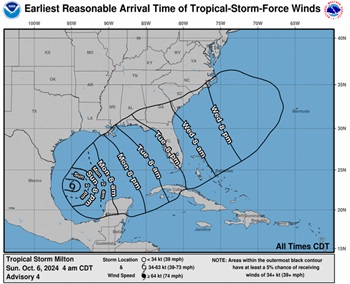 The latest forecast from the National Hurricane Center, released at 4 a.m. Central Time on Sunday, said that Milton will quickly intensify as it moves eastward and northeastward, making landfall in Florida as a Tropical Cyclone on Wednesday. As of Sunday morning, the center of the tropical storm has maximum wind speeds of 50 mph and is moving east at 5 mph. By Monday, winds are forecast to increase to between 74 and 110 miles per hour, and by Tuesday, have winds in excess of 110 miles per hour. The forecast path will cross Florida east to west, centering on Tampa Bay, with the edge of the storm crossing southeastern Alabama, southern Georgia, southeastern South Carolina, and Alabama, southern Georgia, southeastern South Carolina more, >>CLICK TO READ<< 09:32
The latest forecast from the National Hurricane Center, released at 4 a.m. Central Time on Sunday, said that Milton will quickly intensify as it moves eastward and northeastward, making landfall in Florida as a Tropical Cyclone on Wednesday. As of Sunday morning, the center of the tropical storm has maximum wind speeds of 50 mph and is moving east at 5 mph. By Monday, winds are forecast to increase to between 74 and 110 miles per hour, and by Tuesday, have winds in excess of 110 miles per hour. The forecast path will cross Florida east to west, centering on Tampa Bay, with the edge of the storm crossing southeastern Alabama, southern Georgia, southeastern South Carolina, and Alabama, southern Georgia, southeastern South Carolina more, >>CLICK TO READ<< 09:32







